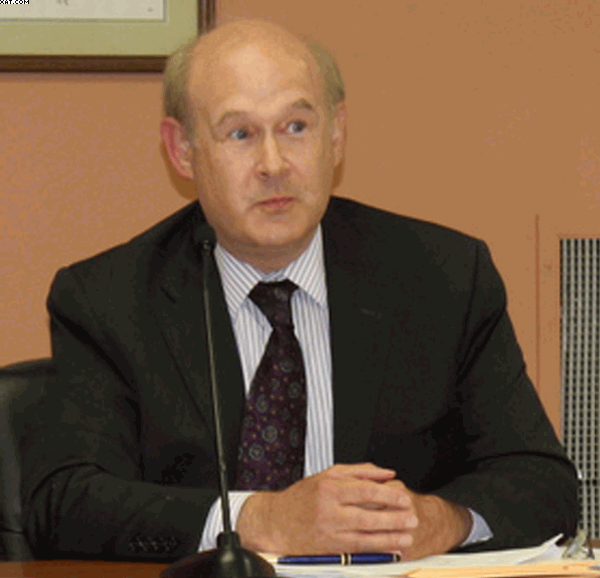McHenry Co. (ECWd) –
The former Algonquin Township Road District Highway Commissioner was recently required to respond to interrogatories in the lawsuit the Road District brought against him in an effort to recover funds allegedly taken in violation of the law. Reviewing those answers and exhibits has now cast a much wider cloud over Miller and his former attorney, James Kelly.
One key question and answer from this interrogatory is where the steam roller begins. Please note there are plenty more articles coming based on the answers Miller provided.
“3. Identify any document supporting your contention that you were entitled to payment of $47,381.84 which was paid by the Algonquin Township Road District on April 12, 2017, with Check No. 17533.”
ANSWER:
See Response to Notice to Produce, specifically, Memorandum dated February 25, 1997, Opinion of the township attorney dated April 11, 2017, and minutes of board meeting dated April 12, 2017.
Investigation continues. Defendant reserves the right to supplement this answer.
We wrote about the alleged memorandum dated February 25, 1997, in this article. In that same article, we stated: “We also understand there has been an insinuation or claim made that these sick days were accumulated from when Miller was an employee. Anyone want to take any bets on whether or not we can prove it was not accumulated during that time?”
Time to collect on those bets!
James Kelly wrote a letter to Miller March 22, 2017, that until recently most believed it was the legal opinion used to justify Miller getting paid for alleged sick days earned. We wrote about that particular letter in this article and emphasized it was not a legal opinion as it failed to include any legal analysis.
Looking at recent court documents we find an Opinion written by Kelly dated April 11, 2017, approximately three weeks after the first letter Kelly wrote regarding Miller’s sick days. Why on earth would he write two letters on the same topic a few weeks apart, assuming the date is accurate? Regardless, the newly discovered opinion, which Kelly has refused to provide to the Road District, is going to be very problematic for Miller and Kelly as it makes multiple false claims.
“In 1995 the Road District Policy changed and eliminated the accrual/banking of sick leave going forward.”
Oh, do tell!
We requested the policy that was in place during Miller’s employment and neither the Township nor the Road District was able to provide a copy, so how is it that Kelly can claim banking of sick leave was eliminated in 1995? Nevermind the fact what happened in 1995 has nothing to do with a policy that was in place in 1993, so why mention it? Is this a way to imply something that is not true? ‘Yeah, sure, the policy changed and we eliminated banking of sick leave in 1995, and by saying that it leads everyone to believe sick days could be banked under the old policy, the one they can’t seem to produce.
Says Who and With What Proof?
Most interesting on the policy issue is that Kelly provided a copy of the actual policy as an Exhibit A and B to his opinion. Those documents are part of Miller’s attempt to defend his actions and were provided in the Discovery phase of the ongoing legal action.
Kelly’s opinion letter: “Algonquin Township Road District had a personnel policy in effect during the period you were a Road District employee and until the time you took office in on April 5, 1993. Exhibit A.”
That means the very policy in question when Miller’s employment ended is Exhibit A. Yep, the one the Township can’t seem to produce under FOIA.
The policy in question begins with a very glaring problem on page one, “Authority”. If we are to believe this policy is, in fact, the policy Kelly relies on, we must ask when was this document created and by who?
We ask because the policy alleges to be applicable to 1993 and earlier yet it cites a non-existent statute that is alleged to be from 1994. “60 ILCS 6/201-20 (1994)” is not found in the Township code, or anywhere else in the Illinois Compiled Statutes.
If they meant to cite 605 ILCS 5/6-201.20, which applies to the adoption of a policy in a Road District, then they have more explaining to do. That particular law requires the policy to be adopted and filed with the Township Clerk. No such policy is in the possession of the Township Clerk. In fact, just before Christmas the Township confirmed they have no such policy, yet we find Kelly providing one to Miller with his legal opinion. So is Kelly hiding public records? It was Kelly who provided the denial through his law firm, and its clear with the paper trail in the courts he is aware of the requested record yet his letter says it does not exist. That FOIA case will be most interesting.
Kelly’s opinion letter: “You decided to keep these sick days banked, as allowed by the Road District personnel policy then in effect, rather than credit this time to your retirement plan.”
So where in this policy does it point too sick days were allowed to be banked? It doesn’t!
Kelly’s opinion letter: “It specifically allows employees to accrue and bank of “Sick Leave, as well as establishes the policy for compensating employees for their unused “Sick Leave” at the time of retirement or termination from the Road District.”
The above quote is one I would say is worth an ARDC complaint about what appears to be fabricating information to support a possible fraud on a local government. He claims the policy “specifically” allows employees to accrue and bank sick leave. Such a claim is 100% false as nowhere in the policy he provided will you find any such language, specific or otherwise, as it relates to sick days. We believe Kelly’s letter was never meant for the public to see and its content explains why they have denied our FOIA request and Gassers’ demand for these records. Anyone reading them can compare Kelly’s claims to the policy and see it is 100% false!
Not only does the policy not make any mention of accrue and bank of sick leave, but there is also zero language for compensating employees for their unused sick leave at the time of retirement or termination from the Road District.
It gets worse for Miller and Kelly!
The only reference to the accrual of time is in relation to Vacation time. Had the policy intended for sick time to be accrued as implied it would have said as much. Of real interest is the specific language it does include on how sick time is to be handled.
From the policy: 1. “The Road District provides compensation for its full-time employee against loss of income because of illness.”
While Kelly goes to great lengths to emphasis what he thinks compensation means, the policy says what it is. Compensation for its full-time employees against loss of income because of illness. Miller claimed to have used three days of sick time during his entire employment. That is an admission there was no loss of income because of illness outside of those three days, thus no payout should have ever happened. The policy does not say sick leave can be banked and paid out as compensation at a later date and Kelly’s efforts to imply as much is simply wrong.
From the policy: “2 . Sick leave benefits will be paid only for approved absences and for times when the employee would normally be scheduled to work.“
Remember that portion in bold as it is a very specific instruction in the policy. Nowhere in the entire policy that was in effect does it point to employees being able to bank sick time, contrary to Kelly’s claims.
What did Attorney James Kelly claim in his legal opinion letter again?
- “In 1995 the Road District Policy changed and eliminated the accrual/banking of sick leave going forward.”
- “You decided to keep these sick days banked, as allowed by the Road District personnel policy then in effect, rather than credit this time to your retirement plan.”
- “It specifically allows employees to accrue and bank of “Sick Leave, as well as establishes the policy for compensating employees for their unused “Sick Leave” at the time of retirement or termination from the Road District.”
Kelly’s statements implying a prior policy permitted accrual/banking of sick leave is a blatant fabrication. His statement that the policy in effect during Miller’s employment allowed sick days to be banked is also a blatant fabrication. And finally, his claim that the policy “specifically” allowed the sick days to be accrued and banked is also false.
Reading the rest of Kelly’s opinion it becomes clear why he included such misleading and false statements in his opinion. He had to create a perception, and then try to link that perception to a few laws in hopes of making people believe this payout was somehow legal.
Kelly concedes the fact the Illinois Wage Payment Act does not address the issue of sick leave. He claims a more thorough review is needed. He goes to great lengths to emphasize keywords like compensation, earned, wages, etc.
“The Act, however, does not provide an independent right to payment of wages and benefits, but rather it only enforces the terms of an existing contract or agreement. In this case, the issue then is whether the Policy is the agreement purposes of the Act.
“Illinois courts have held that an employment policy statement or policy creates an enforceable contract, with respect to sick time, if the policy: 1) contains a promise clear enough that an employee would reasonably believe that an offer had been made, 2) is disseminated to the employees in such a manner that the employee is aware of its contents’ and reasonably believe it to be an offer; and (3) the employee must accept the offer by commencing or continuing to work after learning of the policy or statement.”
While Illinois courts may have held as Kelly implies, we find it most interesting that he fails to cite any such language in support of his opinion
Kelly states: “The Algonquin Township Road District Policy clearly meets all three prongs of this test. The Policy contains a clear promise that sick leave was “earned” “compensation” and that the employee would be paid for the sick leave upon retirement or termination. The clarity of the Policy is evident from its plain reading”
The policy DOES NOT contain any clear language what-so-ever that would indicate to an employee they are going to be able to accrue/bank sick leave. In fact, just the opposite is true. It very specifically outlines: “Sick leave benefits will be paid only for approved absences and for times when the employee would normally be scheduled to work.” Kelly ignores the fact its sole purpose was to compensate for time lost due to illness. How convenient to ignore that very important part of the policy.
That is where the analysis should have stopped as there is no clear language allowing what Kelly claims, but rather clear language that indicates its purpose is directly connected to time lost from illness and Miller makes no claim of not being paid for being ill and missing work. Couple that with the fact the policy says nothing about banking of sick days it’s not hard to understand this entire payout was a scheme to enrich on the backs of the taxpayer.
To drive that point home, there is crystal clear language on how sick leave is to be paid. “only for approved absences and for times when the employee would normally be scheduled to work.”
As if that is not clear enough, using the most basic statutory construction and applying it to the policy, had the policy intended for sick time to be accrued/banked, it would have included such language as found in the section on Vacation time that states such accumulated leave credit will be paid out at the end of the year. The fact it is silent on such accrual and banking of sick leave establishes a prohibition of banking those days. Had the policy intended such banking of sick days it would have made reference to that issue.
We urge everyone to read this article we published as it relates to sick leave and current laws and administrative codes, as it provides direction which appears to disprove Kelly’s legal opinion and conclusions he presented even further.
Kelly’s conclusion: “The Road District’s policy prior to 1995 provided for the accumulation of sick leave by its employees and promised to compensate the employee for this sick leave when the employee was terminated or retired.”
Nowhere in the policy does it point to sick leave as being a benefit that can be accumulated. Stating otherwise appears to be done as a means of nothing more than advocating for his client, the law be damned and the policy ignored.
Kelly also points to the policy on termination to bolster the misrepresentations.
XIV. Termination
1. RETIREMENT – All benefits due the employee at the time of retirement will be paid at the employee’s current rate of pay and will be paid in the employee’s last pay period.
So what part of “will be paid in the employee’s last pay period” does he not understand? Miller’s last pay period was clear back in 1993, and while there is a clearly questionable list of documents that popped up when Miller’s claim of money owed came forward, we still believe the auditor’s letter combined with all the facts point to Miller having been owed nothing because there was no loss of work from illness presented to the employer and no provision for accrual or banking of sick leave.
As if all the fabrication of so many claims was not enough for Kelly, what better way to scare the non-legal minds to pay the claim than make an inference to it being criminal if they don’t?
“The Act further provides criminal sanctions for the willful failure to pay final compensation.”
For all the reasons shared above to include all our past articles on this matter, the Court should rule that Miller owes this money back to the Township Road District, and while attorney fees are rarely included in such an action, I believe a case for sanctions could be made for recovery of those costs. It is crystal clear, claims made as statements of fact in the legal opinion are not in the policy as claimed, and Kelly should be held accountable for such false representations.
Stay tuned for more to come!
The actual policy can be viewed below or downloaded at this link. Anyone that finds any language that supports sick time is accrued and can be banked please let us know!
1993 Policy Exhibt A and B







No Comments
Sorry, the comment form is closed at this time.